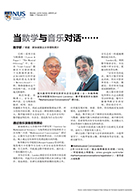Institute for Mathematical Sciences Event Archive
Joint International Workshop of National University of Singapore
Institute for Mathematical Sciences and Yong Siew Toh Conservatory of Music
Mathemusical Conversations
Mathematics and Computation in Music Performance and Composition
(13 - 15 February 2015)
Jointly organized with Yong Siew Toh Conservatory of Music, NUS,
Centre for Digital Music, Queen Mary University of London, UK,
Science and Technology for Music and Sound Lab, IRCAM, CNRS, UPMC, France
Organizing Committee · Invited Speakers · Visitors and Participants · Overview · Activities · Venue
Original Protagonists
- Louis Chen (National University of Singapore)
- Bernard Lanskey (National University of Singapore)
- Bernard Tan (National University of Singapore)
Program Chairs
- Gรฉrard Assayag (Institut de Recherche et Coordination Acoustique/Musique)
- Elaine Chew (Queen Mary University of London)
Local Organizing Committee
- Jenny Ang (National University of Singapore)
- I-Shyan Tang (National University of Singapore)
- Rachel Tang (National University of Singapore)
- Craig de Wilde (National University of Singapore)
Overseas Organizing Committee
Publications Chair
- Jordan Smith (AIST, Japan)
Posters Chair
- Katerina Kosta (Queen Mary University of London)
Mathemusical Conversations is an international workshop bringing together world experts and emerging scholars in and across mathematics and music, with a special focus on mathematical and computational research in music performance and composition that serve as the foundation for understanding and enabling human creativity and for future music technologies.
Ancient philosophers such as Pythagoras, Leibniz, and Diderot have long drawn profound connections between mathematics and music. In the liberal arts education of medieval universities, music was considered one of the quadriviumโfour mathematical science subjects taught after the foundational triviumโalongside arithmetic, geometry, and astronomy. Today, the connections between mathematics and music has renewed relevance, both philosophical because "no domain can any longer be considered and learned in isolation" (Bugliarello 2003), as well as pragmatic.
The rise of computing devices and the ensuing digitization of music has led to new ways to represent, create and perform music, to study and understand it, and to make scientific discoveries as to how music is made and why. Revenue from digital music is predicted to reach USD$22.5 billion by 2017, with the Asia Pacific having a regional compound annual growth rate of 44% (Ovum 27/8/12). At the core of this digital music revolution, are mathematical and computational techniques that drive the scientific advances.
Almost every subfield of mathematicsโincluding number theory, algebraic geometry, topology, geometric analysis, probability, statistics and mathematical physicsโas well as modeling techniqueโincluding optimization, stochastic systems, game theory, and network flowsโhas contributed to these advances in digital music research. Every step of the music process, from composition (including improvisation, a form of real-time composition) to performance, from conceptualization to perception and cognition, can be modeled and studied using mathematical and computational means.
In 1999, a landmark event, the Diderot Forum on Mathematics and Music, led to a seminal book with an an opening quote by Diderot: "c'est par les nombres et non par les sens qu'il faut estimer la sublimitรฉ de la musique" (It is through numbers, rather than through the senses, that music's sublimeness can be measured). Likewise, the Mathemusical Conversations workshop celebrates the understanding of the essence of music through mathematics, and the presentations and discussions will be published in a book to serve as a reference for the state of the art in mathematics and music thinking.
The program, consisting of six thematic sessions and two concerts, is designed for broad appeal not only to researchers in the mathematical music sciences, but also to mathematicians and scientists in general, to musicians interested in the formal models of music knowledge and practice, and the general public.
Many mathematicians and scientists are also fine musicians. For example, the young geometer Donald Coxeter composed piano music and wrote on the parallels between composition and mathematical proof; Albert Einstein was a talented and enthusiastic violinist. At MIT, 60% of incoming freshmen declare advanced proficiency in music (usually performance), and 25% declare proficiency in other performing arts. Conversely, a number of prominent musical figures have publicly acknowledged their passion for mathematics, including the popular American classical composer Paul Schoenfield, who is a keen mathematician. Many of the plenary speakers at the conference embody both the music and mathematic fields, and some have found creative ways to combine the two.
The broad objective of the workshop is to raise awareness of mathematics, music, and the mathematical music fields in Singapore, the region, and beyond.
Workshop, 13 - 15 Feb 2015
Posters were authored by:
- Immanuel Albecht (Technische Universitรคt Dresden), Martin Rohrmeier (MIT), and Stefan Schmidt (Technische Universitรคt Dresden)
- Carlos Almada, Universidade Federal do Rio de Janeiro
- Hรฉlianthe Caure, Institut de Recherche Coordination Acoustique/Musique
- Goktug T. Cinar and Jose C. Principe, University of Florida
- Stace Constantinou, London-based composer
- Pauxy Gentil-Nunes, Universidade Federal do Rio de Janeiro
- Jocelyne Kiss and Serge Lacasse, Universitรฉ Laval
- Katerina Kosta, Queen Mary University of London
- Daniel Moreira de Sousa and Pauxy Gentil-Nunes, Universidade Federal do Rio de Janeiro
- Aishwarya Nair and Patrick Becker, Humboldt University of Berlin
- Tzu En Ngiao, Concordia University
- Tolga Zafer รzdemir, Brunel University London
- Somnuk Phon-Amnuaisuk, Institut Teknologi Brunei
- Rima Poviloniene, Lithuanian Composers’ Union
- Yuping Ren (รcole Polytechnique) and Charo I. Del Genio (University of Warwick)
- Jordan Smith, Queen Mary University of London
- Luwei Yang, Queen Mary University of London
Students and researchers who are interested in attending these activities are requested to complete the online registration form.
The following do not need to register:
- Those invited to participate.
The registration fee includes the following for each registered participant:
(i) Printed name tag;
(ii) Admission to all talks/concerts held amidst the workshop; and
(iii) Refreshments and meal(s) on the days of the workshop.
- 13 February 2015, Friday (1 tea-break and 1 dinner)
- 14 February 2015, Saturday (1 tea-break and 1 lunch)
- 15 February 2015, Sunday (tea-break only)
For walk-in participants, payment will be accepted on site for a fee of SGD 50 per pax on event days.
Payment mode
Credit card โ AMEX / VISA / MASTERCARD. Online registation closed.
Registration will be completed after the payment is made. A receipt will be generated after the registration process is complete. Please save or print a copy of the receipt for your own reference.
All rates are quoted in Singapore currency (SGD) and include 7% GST.
For reference purposes, USD1 is approximately SGD1.3.
Cancellations / Replacements
No refunds can be made for cancellations or for participants who do not show up for the conference. Requests for replacement participants are to be made in writing before 21 January 2015 to program secretariat at ims(AT)nus.edu.sg
Additional Notes:
For registration enquiries, kindly email us at ims(AT)nus.edu.sg
For overseas visitors, kindly take note of the entry requirements into Singapore:
- Passport needs to be with at least 6 months validity from date of arrival
- Valid Singapore visa, if applicable. Click on the following link to find out which countries require an entry visa to Singapore http://www.ica.gov.sg/services_centre_overview.aspx?pageid=252&secid=165
Organizing Committee · Invited Speakers · Visitors and Participants · Overview · Activities · Venue




